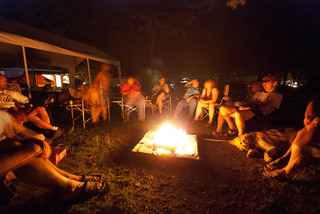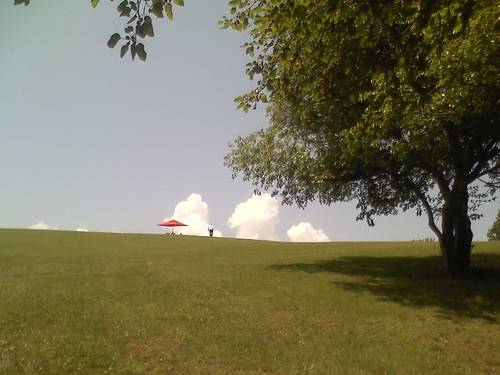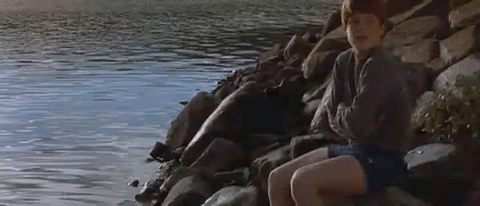Look up today and make a photo that favors what’s going on in the sky.
Archive for the ‘magicmacguffin’ Category
TDC 5/30/12
Wednesday, May 30th, 2012Daily Create 143: Look up today and make a photo that favors…
Wednesday, May 30th, 2012
Daily Create 143: Look up today and make a photo that favors what’s going on in the sky. (Taken with Instagram at Mary Washington Bell Tower)
The Worst Way To Wake Up: A Sound Daily Create
Wednesday, May 30th, 2012For Today’s Daily Create 142
From Hill To Cloud To Tree: An Image Daily Create
Wednesday, May 30th, 2012For Today’s Daily Create 141
Dear Obstinate Learners
Wednesday, May 30th, 2012Sean Astin and Kevin Bacon starred in a film back in the late 80s titled White Water Summer. What starts as a rather innocent summer camping trip meant to help shape a few young men’s outdoor survival skills while teaching important life lessons, turns into a battle of wills. Alan, a teen more focused on sports, computers, and isn’t entirely excited about “roughing it” begins to butt heads with Vic, the lone adult leader of this wilderness adventure. Alan, played by Sean Astin, tries to use his wits and crafts several “smarter” ways of getting things done in the great outdoors, one of the more powerful scenes being his creation of a fishing trap, catching a horde of fish for dinner. Vic, the “do it the right way” leader, admonishes Alan for using his brains rather than his brawn, and after berating him in front of the other campers, he forces Alan to gut all of the fish himself (something Alan doesn’t seem excited about), and leaves him on a small island in the middle of the lake, telling him to signal when he’s done. Alan of course, becomes disgusted, and not only doesn’t signal that he’s finished, but sleeps outside in the rain just to spite Vic’s harsh “life lesson”. The battle between the two only escalates from there, to the point where Vic severely injures himself while trying to teach Alan another lesson. It then turns to Alan to see the entire troop safely down the mountain, using a mix of both Vic’s survival skills and Alan’s ingenuity.
Other than being a rather rudimentary and rushed description of the scene, it’s an excellent metaphor for how I see myself as a learner. It’s not that I want to be obstinate, and purposefully look for ways to “circumvent” what it is that any of my teachers have asked me to do (I asked my 5th grade teacher if I could dress up as an actual flag-pole sitter for our class musical about the roaring 20s rather than dress in a white shirt with a bow tie). I’ve recognized over my 33 years on this planet that I have a fierce independent streak within me, and quite often it shows itself in the learning environment. I want to learn “my way”, reflect upon and build new knowledge in ways that make sense to me, whether they mesh with a given assignment or not, and I’ve butted heads a couple of times with instructors who don’t seem to “get” that what I’m doing is not only helping me learn, but doing so in a much more personal and meaningful way than the assignment they’ve doled out.
That’s not to say that I don’t get along well with my teachers and colleagues, but when your 7th grade science teacher yells out across the room as class is being dismissed, “that’s another nail in the coffin, Rimes” it makes you wonder whether or not you should dial back just how independent you are.
So as I write this letter to any other obstinate learners out there, I say strike a balance! Work with your teacher, but just don’t accept assignments and tasks given to you by your teacher as the simple tasks they may be, completing them without question. Find ways that you can make some of them your own; find ways to inject your own personality into them. Case in point; this letter was supposed to be written as a letter home from camp. Not an actual camp that Alan had to endure under Vic’s leadership, but a virtual one. I’m helping out as a “Camp Counselor” for ds106′s Camp Magic Macguffin for the next 9 weeks (go bunk 5!), and while I was supposed to write this letter to those “back home”, I choose to write it instead as a reflection for those that might struggle with either obstinate learners, or for those that might be obstinate learners themselves. Teachers, please find ways to let your students add their own personality into projects or regular assignments. You might not always get the best academic work out of them, but they’ll be much more engaged in what they’re doing, and the good will you’ll earn usually pays off later when you have to ask them to complete a particular assignment the ways it’s written (because eventually they have to conform at least a bit).
So to all you obstinate learners out there, develop good relationships with your teachers, whether you want to or not. Those relationships will help you in the future. And teachers of obstinate learners, try to find ways to mingle what you need your students to accomplish, with how they want to accomplish it.
Sincerely, Ben
P.S. Camp is great! I already have several baskets woven and more leather punched money pouches that I have pockets!
The Totally Fun and Good Podcast – 001
Wednesday, May 30th, 2012I can’t even begin to describe this one. It happened automatically and I’m quite pleased with the way it all came together.
The segment I recorded on Tuesday wound up being a bit of a draft for the video tutorial I made last night. The final segment, recorded this afternoon delivered quite unexpectedly a most extraordinary title for the episode.
It’s likely that the current run will continue to baffle more than a few people. I suppose that can’t be helped. Everything changes when one is under the spell of short-timer fever.
The Collaborative Web and Storytelling
Wednesday, May 30th, 2012I had a chance to meet Bryan Alexander at the NITLE Symposium this past April – he’s a dynamic thinker and collaborator, for sure. Up to that point, he’d been mentioned in conversations about storytelling, open access, and technology in liberal education. In conversations last semester, Alexander was mentioned as part of our digital humanities definition discussions and early conversations about digital storytelling as a learning tool.
Reading the excerpt from his book provided a window into how collaborative and social web tools can be used to illustrate stories, composition, thinking, and learning (not to mention the geekie brand of fun we all seem to enjoy). No sense in rehashing what was written in the excerpt or on the rest of Bryan’s website. You should explore that on your own. However, some key points, that I gleaned from the reading and reviewing.
The chapter defined and explained uses for various collaborative web tools like blogs, wikis, Twitter, etc. Alexander took the time to give examples of use that clearly show how people can engage high levels of learning. Something we all would like to see happening in our classes. But how?
Take a look at a lot of the learning happening in classrooms around the country. It is a lean back, consume, regurgitate experience. We are fed the information from a variety of sources, left to process it on our own, and output something similar to what was put in (i.e.: lecture and reading to PowerPoint presentation). No doubt there is learning taking place but we’re often left wanting for more both as a learner and as a teacher/faculty member.
 |
| CC BY-NC-SA: We are CS via Flickr |
Enter storytelling; more like re-enter. For centuries humans have shared stories, passed down knowledge, and created new knowledge through stories. We identify with a story and it helps us process complex events, ideas, and concepts.
Alexander suggested that we take this concept and apply it to the collaborative web or Web 2.0 (if you prefer) and challenge our own learning by processing ideas and concepts through a storyline instead of rote memorization and regurgitation.
Alexander provides an example of using a blog (a time-stamped journal on the Internet) as vehicle to re-tell the story of Dracula. Which is a series of letters that are sent and read over a period of time.
Taking Dracula as the example of using a collaborative tool to tell a story, readers can now engage the ideas and story over time as readers, but also comment, share ideas and commentary, or take the topic to a higher level and create a side story that links (freely and openly) to the main blog. Now you’ve got learners doing more than sitting back with a good book; you’ve got them leaning in with a good experience.
The collaborative web provides easy, inexpensive, and interesting ways to engage learning. How about we take science course, a elementary chemistry course, and layer in some storytelling, as an example? No doubt chemistry students need to learn equations and symbols but rather than it be a lean back absorption let’s lean our students forward and get them telling a story about the equations and reactions. Check out Periodic Videos website and see what I mean. Could we have students taking apart an equation from the work, telling a story about the chemicals, reactions, applications, or examples to help them process the information at a higher level of Bloom’s taxonomy? What then could be done if they had a higher level of understanding? Could we then back up and re-approach the equation task?
Why limit ourselves to formal (or informal) education environments? Let’s take a look at how people learn in the workplace. Could we use tools like blogs, videos, wikis, and audio to create stories for new employee orientations or new processes/products/services? A while back I wrote up a literature review about just this subject applied to Millennials – could we use the collaborative web to impact workplace training? Why not extend that further to storytelling via the collaborative web for the benefit and learning of post-graduation learners? Here’s an unedited draft.
All we’re really talking about is a centuries old technique re-imagined with Web 2.0/collaborative tools. If you prefer a more academic description – socially constructivist learning via collaborative Internet technologies.
I’d be remiss if I didn’t link you directly to Bryan Alexander’s book – The New Digital Storytelling: Creating Narratives with New Media so you can buy it and find your storytelling.
Curiosity killing cats and all, what other storytelling books do you find useful?
Week 1 Letter Home
Wednesday, May 30th, 2012
Throughout the first week of camp, the campers including myself set up all of our media outlets including, YouTube, Twitter, Flickr, Hippie Hosting, Word press, and others. I have slowly started to explore these different media web sites. I posted my first YouTube video about a family legend, which is my father.
I watched a video about Dr. Michael Wesch, an Anthropologist professor at Kansas University. His questions and research involved why students have trouble learning in class and if more people were driven by questions what would the world be like. More questions that he thought about while spending time in New Guiney is who am I? How will I get recognition from it? People only feel the need to know who they are if they are in a society in which they are familiar with. He came to realize that there is a new type of media. An identity is not about yourself but about the people around you, who actually know and care for you. The media can mediate relationships, especially with new outlets such as Facebook and Twitter.
Also discussed was Global Collaboration. People share things over the Internet sometimes with out even knowing one another. For example music and pictures are often used in peoples films, advertisements or short clips. Wesch believes that students learn exactly what they do outside of the classroom. He thinks that social media can be a positive and negative influence among students. It creates community and surveillance, isolation and participation, a better democracy and distraction for all students.
I’ve already had somewhat of an understanding of social media and how it alters relationships and builds them, but after this week I have learned so much more. I am excited to see what is to come in the following weeks!
Vitriolic Letter Home
Wednesday, May 30th, 2012Dear parents,
I know that you think you were punishing me by sending me away to Camp Macguffin. Not! Your plan has failed. I am having a blast and I have met many new people who — guess what — think just like me. I am discovering that being creative is a bonus and not the character-flawed, won’t follow the rules, messed up artistic nature you have tried to brainwash me into thinking it is.
That’s right C R E A T I V I T Y is getting amplified in me this very minute, making me more of who I really am…more of exactly that characteristic you have despised in me all these years.
Anyways, I hope you enjoy your summer without me, because I know I will be sure to enjoy mine!
Your rebellious, crabby, creative daughter,
OhRainDear
The Daily Creates, 138-142
Wednesday, May 30th, 2012I am posting my contributions to The Daily Create. I must be doing something wrong with the tags or I have my flickr settings wrong because the photographs I uploaded yesterday (and I think I tagged correctly) are not being recognized.
TDC 138 – Building
http://www.flickr.com/photos/jessrigelhaupt/7290371224/

TDC 139 – Moon
http://www.flickr.com/photos/jessrigelhaupt/7290372466/

TDC 140 – Motion
http://www.flickr.com/photos/jessrigelhaupt/7290371706/

TDC141 – Connection
http://www.flickr.com/photos/jessrigelhaupt/7290372878/

TDC142 – Annoying Noise







